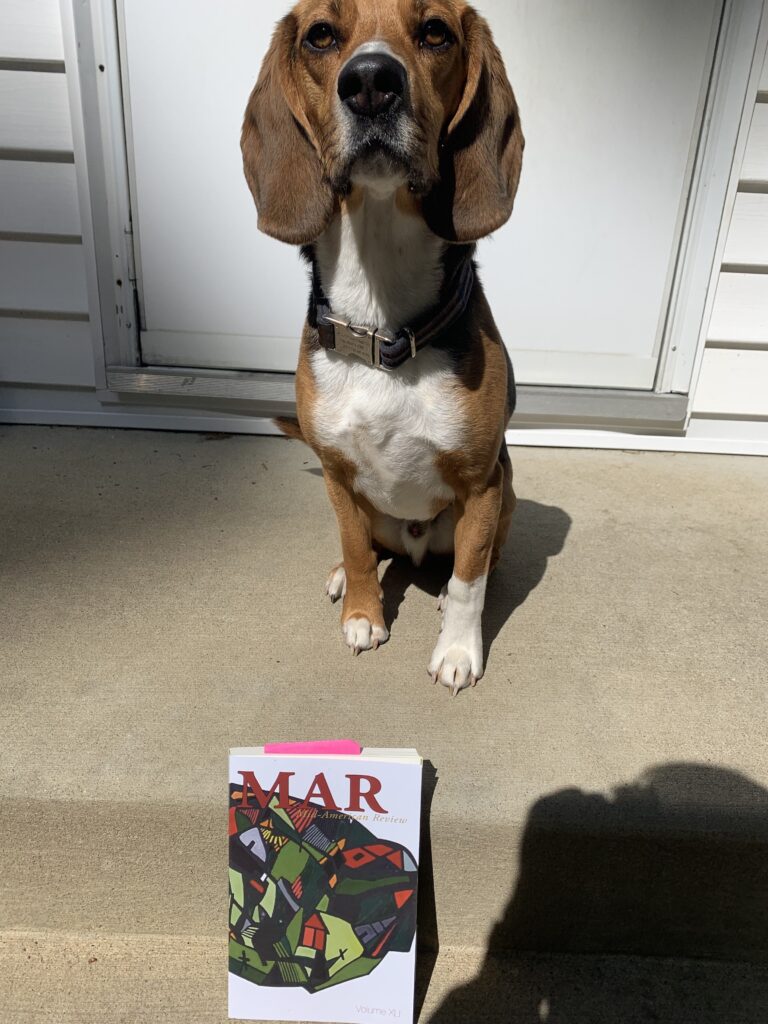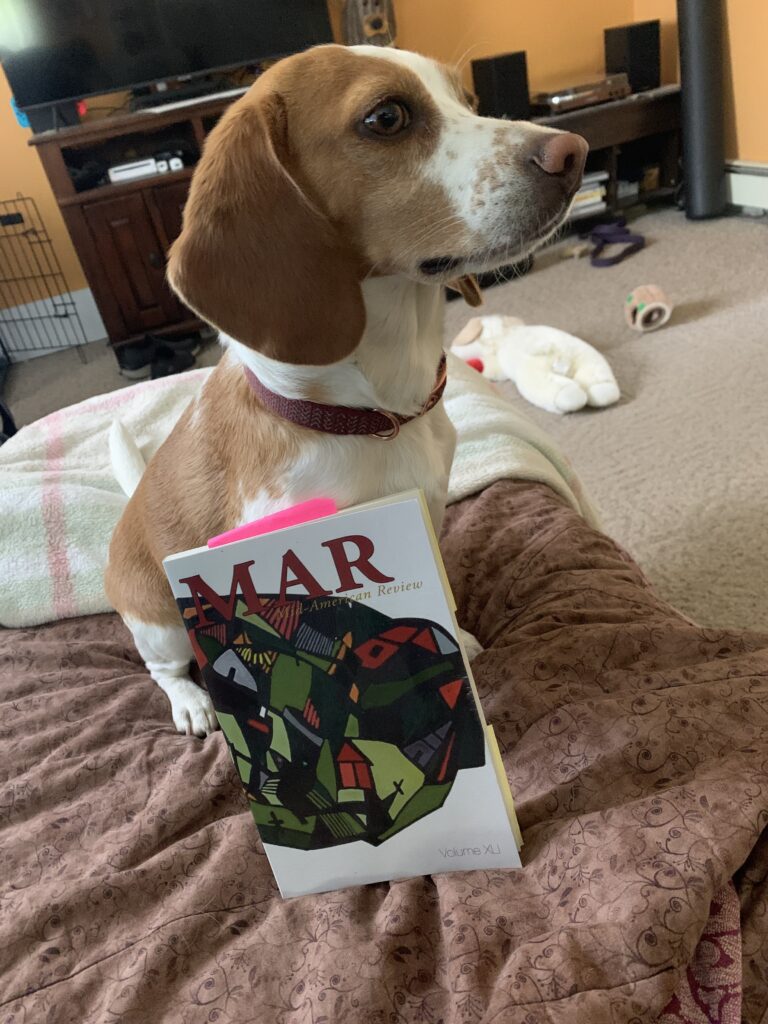Gabrielle Bates is the author of the poetry collection Judas Goat (Tin House, 2023), a New York Times ‘The Shortlist’ pick and a Chicago Review of Books ‘must-read’ book of 2023. Originally from Birmingham, Alabama, Bates currently lives in Seattle, where she works for Open Books: A Poem Emporium, co-hosts the podcast The Poet Salon, and teaches occasionally through the University of Washington Rome Center and Tin House Writers’ Workshops, among other universities and arts organizations. Her work has been featured in the New Yorker, Ploughshares, Poem-a-Day, Best American Experimental Writing, and elsewhere. Follow her on Twitter: @GabrielleBates
We published your poem, “Monologue with a Flat Hand,” in vol. XXXVII no. 1 in the Fall of 2016 which eventually appeared in your debut full-length collection Judas Goat (Tin House, 2023) under the title, “Should the First Calf of Winter Be White, You’re Going to Hate.” The poem changed quite a bit before the recent publication in your collection. How do you negotiate that need for revision after initial publication?
That poem tortured me! Before Mid-American Review published a version of it, and for years afterward, I couldn’t shake the feeling that the poem had a lot of potential, if I could just figure out what it wanted to do or say—something about it was eluding me. I wish I could pull that issue off the shelf and compare the two versions, because I don’t remember exactly what all I changed between the journal and the book publications—I know I changed the ending (and the title obviously) but there are other moments too, I’m sure, that are different!—but I’m house-sitting right now, so I don’t have access to the original.
It doesn’t matter if a poem has already been published or not; if I sense a way to make it more alive and resonant, I make those changes. Just because I’ve published a poem doesn’t mean the poem has found its most energetic language or form. In fact, it’s often only after I’ve published a poem in a journal that I see places where I could cut back and release more energy into the poem.
You have a very extensive list of publications in the acknowledgements of Judas Goat. When do you know a poem is ready to go out as a submission to literary magazines/journals?
My approach throughout my twenties—the decade I was working on Judas Goat—was “throw a lot of spaghetti at the wall and see what sticks.” I’d write, workshop, revise, and then send a poem out to journals in a fairly speedy cycle. Sometimes way too speedily: I’d write a draft and send it out almost immediately, awash in the creation afterglow, though I always regretted that later. In general I thought: If an editor thinks it’s good enough to publish, it must be. Who am I to say or know when a poem is “done” or “good enough”? In my early twenties especially, I was anxious for others to tell me about my work and its worth. I believed myself too ignorant to perform that role reliably for myself. And because I was a young, unknown writer from Alabama, who didn’t go to NYU or anything like that, I felt like I could trust editors to judge my work on its own merits. I don’t feel that way anymore (I have trust issues!), so I haven’t been submitting much at all since I finished Judas Goat. I’m trying to slow down and hone my intuition about when poems are ready to live in the world outside of me.
When do you know a poem needs to stop being submitted for publication?
If I’ve pushed a poem as far as I can, and I believe in it (a rare occurrence), and a trusted friend has read it and told me they love it, then I will never stop submitting it. Otherwise, I tend to stop submitting a poem once I’ve realized it’s not done or alive enough to be worth putting out into the world.
How do you find the final shape a poem aches to be?
Oh, I love the verb “aches” here. So interesting—poem framed as a living being, capable of ache. I try to find a poem’s most-alive shape by employing an alchemy of time, reading aloud, and sharing with trusted readers for feedback. Often the first interesting sentence or line of a draft will carry a clue for me in regards to how the poem as a whole wants to approach lineation and stanza, like a blueprint.
The writing and publishing process takes time as we published your poem in 2016 which then later appeared in your collection in 2023. How long did the process take from the moment you realized you had a book, to submitting your manuscript for publication?
Someone advised me to start submitting my first-book manuscript before I thought it was fully ready, so I did that for a few years, using contest deadlines as a prod to try and wrangle what I had into book-length shape. I felt close to having the manuscript done for years, but it wasn’t until after I had the book deal with Tin House, and after I’d gone through some final editing rounds with my editor Alyssa Ogi that I actually felt the book was ready to publish.
Some of us are, pathologically, never content with what we’ve made; it’s a constant push and pull between honoring the hopes and standards we have for art, while not becoming overly precious or private about it.
What most surprised you after your debut published?
Anytime a person I don’t know posts something insightful about Judas Goat on the internet, I’m shocked. I’m like: How did the book even find its way to you?! The population of people who buy and read contemporary poetry collections in the U.S. is fairly miniscule, compared to other genres especially, and yet Judas Goat has ended up in places I never expected—It’s all very wild and surprising to me. The most surprising moment was probably when Jorie Graham said kind words about my book on Twitter. I’ve never met her and had zero reason to believe the collection would be on her radar at all. Still doesn’t feel real.
How has your relationship with Judas Goat changed since first holding a copy of the book in your hands and seeing it out in the world?
The book publishing process, like any major life event, is full of emotional vertigo, moments where you think you’re supposed to feel one way, and you actually feel another way. I panicked when I saw my book in person for the first time, I’ll be real with you. I thought: This is it? and then: WHAT HAVE I DONE. I don’t feel that way anymore, luckily. Friends and generous, thoughtful readers have helped me step into a more celebratory mode around the book. I wouldn’t say I feel detached from it now, but I feel more detached than I did when I held it for the first time—in a healthy way.
The first poem in Judas Goat titled “The Dog” is shocking with its unforgiving portrayal of the violence we cause. The poems in the collection keep returning to this motif of violence and ruin; however, there are also intimate moments within the collection like in the poem, “The Greatest Show on Earth.” What is the relationship between the violence and the more intimate moments within the collection?
I’m interested in what happens in the small theaters of life, where there are very few witnesses; when private, intimate moments and conversations are imagined or dramatized and made public, through art, that’s really interesting and evocative for me. There’s an inherent tension. In juxtaposing or otherwise engaging aspects of violence and intimacy, I think I was trying to understand something about my relationship to vigilance, abandon, and risk.
Many of your poems reference mythical, fairytale, and religious figures such as Eurydice, Gretel, and Mary all of whom you give voice or space within the collection. How have these women impacted your life and your writing?
I’m interested in the ways stories shape our lives. Fairytales and myths from various traditions have always haunted me, particularly the stories about young women in danger, which felt designed to teach me something about what it meant to be a young woman in danger.
Judas Goat is such a stunning collection full of poems that are both inviting and frustrating which, I feel, the best poems usually are. What makes a poem for you?
What makes a poem, for me, on the most basic level, is a surprising and evocative progression lines. My favorite poems impart both clarity and mystery—Reading them, I feel something intense, but I also don’t quite know exactly what just happened to me, or what I’ve taken from it. I love that tension between vividness and endless interpretation, vulnerability and privacy. “Both inviting and frustrating”! I love that you said that. There is an element of frustration, isn’t there? Frustration keeps me alive, keeps me writing. It’s a form of closeness, and a kind of belief.
***
––Tyler Michael Jacobs, Blog Co-Editor


